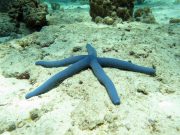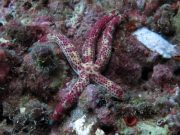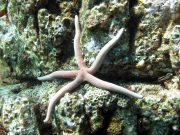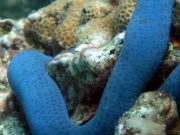Diving with Snake Sea Stars
Lanta Marine Life | Ophidiasteridae
The Snake Sea Stars are a large family of sea stars, named after the slender members of the genus Ophidiaster, which have snake-like arms. They are found in abundance at all of the sites during our Koh Lanta dive trips.
Many species are brightly coloured and patterned, mimicking the appearance of other marine animals which may be poisonous or dangerous for protection.
Snake Sea Stars have several rows of tube feet on their underside which can be used for movement, sensing their environment, and detecting food.
These sea stars may be found on coral or rock reefs, and over and within sand substrate, and are a common sight at all dive sites around Koh Lanta.
They feed on algae, carrion, detritus, coral mucous, microorganisms and sponges. In turn they are preyed upon by crabs, fish, gastropods, and shrimp.
Some species have remarkable powers of regeneration, allowing them to shed and regrow arms, or reproduce by shedding an arm which then generate a new disc and arms to form a new individual.
The Linckia genus, which we find at all dive sites around Koh Lanta, is prayed upon by Harlequin Shrimp (Hymenocera picta) and can completely regrow lost limbs.
2 species found on this page:
Blue Sea Star
(Linckia laevigata)
The Blue Sea Star is very common, seen at all dive sites around Koh Lanta. This sea star normally has five long, thin arms extending from the small central disc, with rounded tips at each end. The arms are covered in numerous closely packed lines of faint, slightly raised spots.

Linckia laevigata @ Koh Haa
The Blue Sea Star is often blue, but is also found in other colours, beige, orange, red, peach, brown and many variations in between.
The Blue Sea Star grows to 30 cm and are found in shallow water exposed to sunlight, either singly, or in groups. This sea star can be found on the sand or rubble bottom, on rocky walls, on corals, sponges, just about anywhere in the reef area. The diet includes organic matter, dead animals, small invertebrates and anything else tasty that comes their way.
Red Star
(Linckia multifora)

Linckia multifora @ Koh Bida
The Red Star has a small central disc and 5 thin arms which taper toward the end. This species has a very similar shape to the Blue Seastar.
This species has a variable body colour, from cream to grey to brown to red and pink. The body is covered with red spots and many small granulations. A Red Star can grow up to 13 cm in diameter.
The Red Star is capable of self amputation) and often sheds one or more arms, which can then grow into a new individual. The arm detachment process takes up to an hour, with a small crack appearing on an arm, approximately 2.5 cm from the disc. Once the crack has appeared, the tube feet on the arm and the body pull the two parts in opposite directions. The detached arm is known as a 'comet' and moves about independently. It takes about 10 months to regenerate a new disc.
Diving with Snake Sea Stars around Koh Lanta
Scuba Diving & Snorkel Trips
If you'd love a chance to spot Snake Sea Stars on one of our daily high season diving trips from Koh Lanta then send us an email to info@diveandrelax.com.
Join our high season speedboat dive trips to some of Thailand's best dive sites and enjoy small groups, short journey times, with a focus on great personal service, safety and fun.
Not yet a certified diver? Learn to Scuba Dive on Koh Lanta with the 3 day SSI Open Water Diver course.
Book online to save 10% on dive trips and scuba courses on Koh Lanta.
Find Out More
Indo-Pacific Marine Life Guides
- Allen, G., Steene, R., Humann, P., DeLoach, N. (2003) Reef Fish Identification, Tropical Pacific. Jacksonville, FL., USA: New World Publications, Inc., ISBN 1-878348-36-1.
- Humann, P., DeLoach, N., (2010) Reef Creature Identification, Tropical Pacific. Jacksonville, FL., USA: New World Publications Inc., ISBN 978-1-878348-44-9
- Debelius, H. (2013) Indian Ocean Reef Guide. Frankfurt, Germany: IKAN - Unterwasserarchiv, ISBN 978-3-939767-52-7.
- Debelius, H. (2004) Nudibranchs and Sea Snails, Indo-Pacific Field Guide. Frankfurt, Germany: IKAN - Unterwasserarchiv, ISBN 3-925919-51-1
- Erhardt, H., Knop, D. (2015) Corals Indo-Pacific Field Guide. Frankfurt, Germany: IKAN - Unterwasserarchiv, ISBN 3-925919-69-4.
- Veron J.E.N., Stafford-Smith M.G., Turak E. and DeVantier L.M. (2016). Corals of the World


